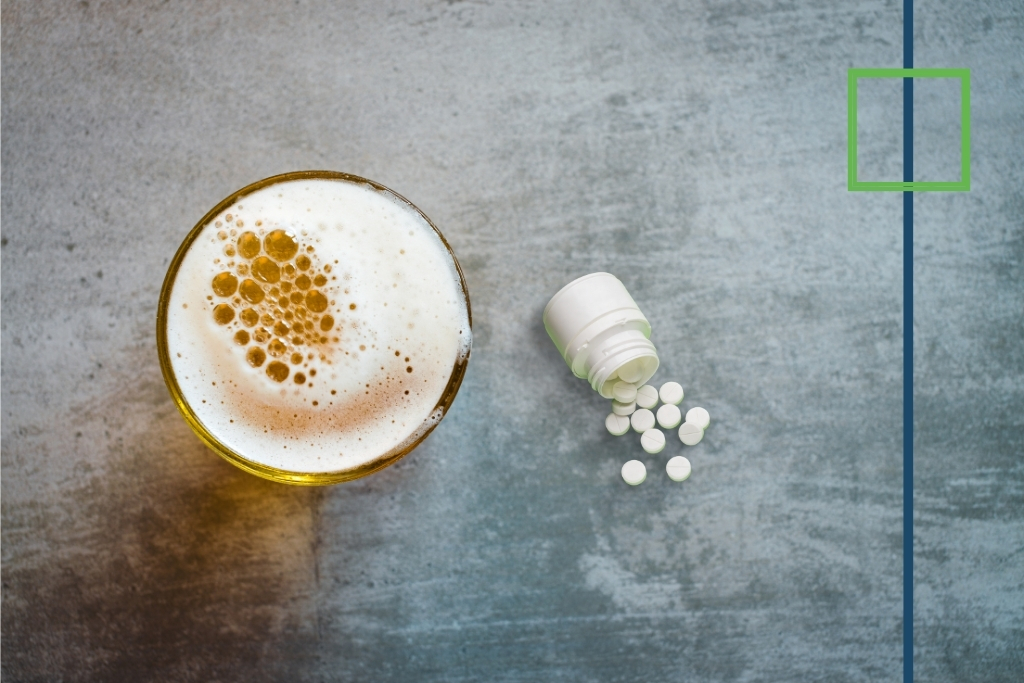What is Xanax?
Xanax, a brand name for alprazolam, is a potent and the most commonly prescribed benzodiazepine (benzos) that is only recommended for use for up to six weeks [1]. It is a prescription drug used for anxiety treatment. Xanax is also prescribed for panic attack treatment. Taking Xanax use can lead to physical dependence and addiction. In addition, withdrawal is one of the most common Xanax side effects. It is experienced when someone reduces or stops using this prescription drug, which can lead to complications such as panic attacks, insomnia, and seizures. Withdrawing from Xanax under an inpatient drug rehab specializing in Xanax detox reduces the risk for complications and helps the individual experience a safer, more comfortable recovery.
Xanax works by decreasing abnormal excitement in the brain. Xanax slows down the movement of brain chemicals that may have become unbalanced, resulting in a reduction in nervous tension and anxiety. Xanax works by boosting the effects of a natural chemical called gamma-aminobutyric acid, which is made in the brain.
Many people who take Xanax recreationally or without a prescription describe the feeling as sedating or calming. Unlike some drugs, such as cocaine, that produce a “high” or euphoric feeling, Xanax users describe feeling more relaxed, quiet, and tired. These feelings may lead to falling asleep or passing out for a few hours. Mixing cocaine and Xanax is pretty common, which can lead to a coma, potential paralysis, or even overdose death.


Get Your Life Back
Find Hope & Recovery. Get Safe Comfortable Detox, Addiction Rehab & Mental Health Dual Diagnosis High-Quality Care at the We Level Up Treatment Centers Network.
Hotline (877) 378-4154The Effects of Xanax
Just because Xanax is legal and prescribed doesn’t mean that it can’t harm you. Unfortunately, there are a number of prescription drugs that many people abuse that is widely available. Even though pharmaceutical medications must be received via a prescription obtained from a doctor, they can still be easily abused. Xanax is one of the most easily-prescribed medications, and due to its accessibility, it is dangerously prone to abuse. When used outside of the supervision of a prescribing medical professional, this anti-anxiety medication can do more harm than good.
Although there have been a number of recent efforts aimed at curbing prescription drug abuse, this is still a major concern, especially for anti-anxiety medications like Xanax. While there remains a black market for addictive pharmaceuticals, it’s important for everyone to know some of these substances’ harmful effects on the body, especially the brain.
Xanax Effects on the Body
The intoxication caused by Xanax and most benzos is often compared to alcohol, impairing mental alertness, motor coordination, and mechanical performance such as driving, causing dizziness, slurring speech, and evoking a strong sense of drowsiness and lethargy. These varied effects are caused by the drug’s more specific effects on the brain and its chemistry.
Xanax functions by increasing the production and effectiveness of a neurochemical called GABA, which is responsible for calming a person during times of stress. With continued abuse of this drug over an extended period of time, the brain becomes ineffective at producing GABA., which means that individuals who abuse Xanax persistently over time actually become less able to overcome stress and anxiety without relying on medication.
Those who have become dependent on Xanax may experience other side-effects, such as confusion and an inability to think clearly, racing thoughts, excessive and erratic risk-taking behavior, and bouts of severe depression (which may be accompanied by suicidal thoughts). These all result from severe imbalances in brain chemistry.

Xanax Effects on the Brain
Xanax is good at providing calm during chaotic situations. It sedates the central nervous system (brain and spinal cord), relaxing your brain and body. Heart and respiratory rate slow. These calming effects can be extremely helpful for people diagnosed with anxiety disorders and panic disorders. However, sedation over a longer-term period can lead to memory problems. Some reports suggest Xanax can increase the chances of Alzheimer’s and dementia. The longer your brain is on Xanax, the more it will adapt and continue to slow functioning throughout the mind and body.
Xanax Effects on Mental Health
Xanax releases higher levels of the neurotransmitter dopamine into the brain, making you feel pleasure. Over time, this excitement decreases in the brain. Some users may even experience hopelessness and have suicidal thoughts. Those who had depression before they start taking Xanax may also experience mania that is mostly linked with bipolar disorder. Mood swings between depression and mania can be intense and interfere with daily life.
Long-term Xanax consumption can paradoxically increase the same symptoms of anxiety that it was originally prescribed to treat. One example of this phenomenon is rebound anxiety, a condition in which increased anxiety returns in between doses. Xanax is a short-acting drug, and it only lasts for a few hours. In the absence of healthy coping skills, anxiety can feel like it is getting worse each time the medication’s calming effects subside.
Get Help. Get Better. Get Your Life Back.
Searching for Accredited Drug & Alcohol Rehab Centers Near You? Or Mental Health Support?
Even if you have failed previously, relapsed, or are in a difficult crisis, we stand ready to support you. Our trusted behavioral health specialists will not give up on you. Call us when you feel ready or want someone to speak to about therapy alternatives to change your life. Even if we cannot assist you, we will lead you wherever you can get support. There is no obligation. Call our hotline today.
FREE Addiction Hotline – Call 24/7Xanax Effects on Mental Health
Xanax releases higher levels of the neurotransmitter dopamine into the brain, making you feel pleasure. Over time, this excitement decreases in the brain. Some users may even experience hopelessness and have suicidal thoughts. Those who had depression before they start taking Xanax may also experience mania that is mostly linked with bipolar disorder. Mood swings between depression and mania can be intense and interfere with daily life.
Long-term Xanax consumption can paradoxically increase the same symptoms of anxiety that it was originally prescribed to treat. One example of this phenomenon is rebound anxiety, a condition in which increased anxiety returns in between doses. Xanax is a short-acting drug, and it only lasts for a few hours. In the absence of healthy coping skills, anxiety can feel like it is getting worse each time the medication’s calming effects subside.
Xanax and Alcohol Interaction
Using Xanax and alcohol together will intensify the effects of both substances. Researchers haven’t been able to understand why this occurs. However, it’s likely due to chemical interactions between Xanax and alcohol in our bodies.
A study on animals released in 2018 suggested the presence of ethanol, which is the main ingredient in an alcoholic drink, might increase the maximum concentration of Xanax in the bloodstream. This can lead to an “enhanced” high, as well as enhanced side effects. It also pushes the liver to work harder and break down both Xanax and alcohol in the body.
Mixing Xanax and Alcohol Side Effects
Sedation
Both Xanax and alcohol produce sedative effects, meaning you’ll experience impairment, drowsiness, or fatigue. The use of each drug individually may also cause sleepiness. Both drugs affect your muscles, making coordination, muscle control, and balance all the more challenging. You could end up stumbling or slurring your speech. These effects will worsen when the drugs are used together.
Mood and Behavioral Effects
Xanax may lead to depression, irritability, and confusion. In some cases, an individual may experience suicidal thoughts, but that’s not a common effect. If you experience suicidal thoughts, you should call for help immediately.
Other rare side effects of mixing Xanax and alcohol include:
- Aggression
- Hostile behavior
- Rage
Alcohol can also potentially affect your mood in various ways. For some, it’ll cause a boost in mood, despite it being a depressant. Others may experience adverse side effects, such as sadness. Alcohol also impairs your judgment and lowers inhibitions, making it easier to do things you might not regularly do. These behavioral effects and mood changes are more severe when using both Xanax and alcohol together.
Memory Impairments
Both drugs are associated with memory loss, and the effect is more pronounced when the two substances are used in conjunction with one another. Combining both substances increases the chances of a blackout, meaning you may not remember what happened.
Physical Side Effects
In addition to the side effects listed above, these drugs can cause severe physical side effects. The most common physical effects of Xanax include:
- Low blood pressure
- Blurred vision
- Headaches
- Diarrhea
- Nausea
- Vomiting
Drinking alcohol in excess can also cause blurred vision, headaches, and other gastrointestinal issues as well. Again, using the two together will increase the chances you experience these physical side effects.
Comfortable Facilities & Amenities
High-Quality Addiction & Mental Health Rehabilitation Treatment
Rehab Centers TourRenowned Addiction Centers. Serene Private Facilities. Inpatient rehab programs vary.
Addiction Helpline (877) 378-4154Proven recovery success experience, backed by a Team w/ History of:
15+
Years of Unified Experience
100s
5-Star Reviews Across Our Centers
10K
Recovery Success Stories Across Our Network
- Low Patient to Therapist Ratio
- Onsite Medical Detox Center
- Comprehensive Dual-Diagnosis Treatment
- Complimentary Family & Alumni Programs
- Coaching, Recovery & Personal Development Events
The Dangers of Mixing Alcohol and Xanax
Both Xanax and alcohol have individual sets of side effects that impact an individual’s behavior and mental state. Because of this, the two should never be used together as it can cause life-threatening consequences. When used with alcohol, the introduction of Xanax to one’s body can cause one’s heart to stop beating, hamper neural activity, or slow your breathing to the point of respiratory failure, permanent brain injury, coma, or death.
It also increases the likelihood of a Xanax overdose, which can lead to respiratory depression, seizures, and potentially even death. An abundance of Xanax and alcohol can relax and slow body functions to the point that the user’s heart stops beating or they stop breathing, again resulting in a coma or death.
Lethal Dose of Xanax and Alcohol
There is no known and confirmed lethal dose of Xanax for humans. The FDA found that the lethal dosage in rats is 331-2171 mg/kg. Other experiments in animals concluded death in instances of 195 mg/kg, which is 975 times higher than the recommended maximum human dosage of 10 mg per day.
If a person consumes a few drinks and has BAC levels between 0.05% and 0.15%, this will likely result in impairments such as slurred speech, memory loss, and poor driving skills. If someone reaches BAC levels closer to the 0.31% to 0.45% range, they may lose consciousness, overdose, and suffer from vital organ failures.
The prescribed dose of Xanax ranges between 1-10mg per day for anxiety and panic disorders. If you are taking Xanax without any side effects, adding alcohol will lead to undesirable side effects. This will also increase dependence and chances of taking lethal doses. However, the lethal dose depends on many factors like:
- Age
- Sex
- Weight
- Tolerance of the body
- Ability to metabolize Xanax and alcohol
- Other health issues
- Other medications you are taking
In short, the lethal dose varies from person to person. The lethal dose for one cannot be lethal for the other person. But mixing Xanax and alcohol is always dangerous and life-threatening.
Xanax and Alcohol Overdose
When mixing Xanax and alcohol, some side effects can be extremely dangerous. In severe cases, an alcohol and Xanax overdose can occur. Alcohol abuse overdoses arise when parts of the brain controlling essential life-support functions become overwhelmed with the amount of alcohol in the bloodstream. These functions then begin to shut down. These life-support functions include heart rate, breathing, and temperature control.
Xanax and Alcohol Overdose Symptoms
When another central nervous system depressant like Xanax is used with alcohol, the risk of overdose increases.
If someone is overdosing from Xanax and alcohol use, they made exhibit the following symptoms:
- Significant confusion
- Severe coordination issues or loss of balance
- Significant drowsiness and an inability to stay awake
- Significantly slowed breathing
- Unresponsiveness
- Loss of consciousness
- Coma
A Xanax and alcohol overdose can lead to severe short and long-term effects, including:
- Respiratory depression
- Seizures
- Death
If you see someone experiencing symptoms of a Xanax and alcohol overdose, seek immediate medical help.
World-class, Accredited, 5-Star Reviewed, Effective Addiction & Mental Health Programs. Complete Behavioral Health Inpatient Rehab, Detox plus Co-occuring Disorders Therapy.
CALL (877) 378-4154End the Addiction Pain. End the Emotional Rollercoaster. Get Your Life Back. Start Drug, Alcohol & Dual Diagnosis Mental Health Treatment Now. Get Free No-obligation Guidance by Substance Abuse Specialists Who Understand Addiction & Mental Health Recovery & Know How to Help.
Xanax and Alcohol Addiction Treatment
There is a strong link between mental health and substance abuse. Individuals who struggle with mood disorders like depression and anxiety are more susceptible to developing an addiction to drugs or alcohol, often to self-medicate symptoms of their underlying mental health condition. These co-occurring disorders can make each other worse without proper treatment.
To determine the most effective ways to treat Xanax and alcohol addiction, it’s crucial to first get an accurate assessment of all the symptoms. When the symptoms have been evaluated by a mental health professional, it may be determined that another form of mental condition is present and needs a particular type of treatment. Very often, some combination of psychotherapy, medication, and/or lifestyle changes are effective for coping with functional.
Medically-Assisted Detox
Detox is often considered the first stage of treatment. It will help you navigate the complicated process of withdrawal, but it doesn’t address patterns of thought and behavior that contribute to drug abuse. Various treatment approaches and settings can help provide the ongoing support necessary to maintain long-term sobriety after you complete detox.
Cravings are very common during detox and can be challenging to overcome. This often leads to relapse. Constant medical care provided during inpatient treatment helps prevent relapse. Clinicians can provide necessary medication and medical expertise to lessen cravings and the effects of withdrawals.
Psychotherapy for Depression and Anxiety
Several different modalities of psychotherapy have been used in the treatment of depression including:
- Cognitive Behavioral Therapy (CBT) – an effective treatment that involves making changes in both the patterns of negative thoughts and the behavioral routines which are affecting the daily life of the depressed person for various forms of depression.
- Person Centered Therapy – a strategy that allows and encourages clients to understand and resolve their concerns in a safe, support environment.
- Solution Focused Therapy – an approach interested in solutions which can be quickly implemented with a simple first step leading to further positive consequences.
Dual Diagnosis Treatment
Substance abuse and mental health disorders often co-occur. In many cases, traumatic experiences can result in a mental health disorder and substance abuse. Dual diagnosis rehabilitation treats both of these issues together. The best approach for the treatment of dual diagnosis is an integrated system. In this strategy, both the substance abuse problem and the mental disorder are treated simultaneously. Regardless of which diagnosis (mental health or substance abuse problem) came first, long-term recovery will depend largely on the treatment for both disorders done by the same team or provider.
Medication-Assisted Treatments
Medication-Assisted Treatments (MAT) for substance use disorders and mental health disorders are commonly used in conjunction with one another. This includes the use of medications and other medical procedures. During your rehab, the staff from your treatment facility will help you identify what caused your addiction and teach you skills that will help you change your behavior patterns and challenge the negative thoughts that led to your addiction. Sometimes, the pressures and problems in your life lead you to rely on substances to help you forget about them momentarily.
Someone with a Xanax addiction may take up to 20 or 30 pills per day. If the user decides to stop the Xanax dosages, they may experience withdrawal effects such as anxiety, restlessness, insomnia, and tremors. The development of tolerance and withdrawal are indications of addiction. If you or a loved one are struggling with long-term Xanax and alcohol addiction and a co-occurring mental health condition such as anxiety and depression, contact one of our helpful treatment specialists today. We Level Up NJ can provide information on dual diagnosis and detox programs that may fit your specific needs.

Experience Transformative Recovery at the We Level Up Treatment Center.
See our authentic success stories. Get inspired. Get the help you deserve.



Start a New Life
Begin with a free call to an addiction & behavioral health treatment advisor. Learn more about our dual-diagnosis programs. The We Level Up treatment center network delivers various recovery programs at each treatment facility. Call to learn more.
- Personalized Care
- Caring Accountable Staff
- Comfortable Amenities
- Licensed & Accredited
- Renowned w/ 5-Star Reviews
We’ll Call You
Xanax and Alcohol Video
Discover the critical information you need to know about the potentially lethal combination of Xanax and alcohol in this eye-opening article. Xanax, a powerful benzodiazepine used to treat anxiety and panic disorders, may seem harmless when prescribed, but its misuse can have severe consequences.